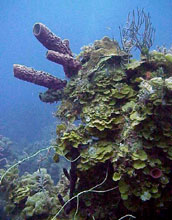Multimedia Gallery
Aquatic Chemical Signaling (Image 2)
Aquatic Chemical Signaling (Image 2)
Seaweed Lobophora variegata. Georgia Institute of Technology assistant professor Julia Kubanek and her colleagues at the Scripps Institution of Oceanography have investigated Lobophora variegata, and discovered it has a strong antifungal potency and potentially some cancer-fighting power.
The study, which Kubanek started as a postdoctoral fellow at Scripps and completed after coming to Georgia Tech, focused on whether seaweeds in the ocean can avoid infection by fungi and bacteria through the production of their own natural antibiotics. The seaweeds live in constant contact with potentially dangerous microbes, suggesting they are under pressure to evolve some kind of resistance.
Kubanek and her colleagues may have discovered a new antibiotic with a complex chemical structure that is somewhat similar to other antibiotics produced by terrestrial bacteria. The compound has a strong antifungal potency and potentially some cancer-fighting power as well. The pharmaceutical company Bristol-Myers Squibb is a partner with Scripps and is collaborating on the ongoing research. The scientists still have to determine whether the seaweed is actually the original source of the antibiotic.
Kubanek is a National Science Foundation Faculty Early Career Development (CAREER) Program awardee. (Date of Image: 1999) [Image 2 of 2 related images. Back to Image 1.]
Credit: Photo by J.R. Pawlik, off Andros Island, Bahamas; courtesy Georgia Tech
Special Restrictions: For editorial use only; not for advertising, commercial or for-profit use.
Images and other media in the National Science Foundation Multimedia Gallery are available for use in print and electronic material by NSF employees, members of the media, university staff, teachers and the general public. All media in the gallery are intended for personal, educational and nonprofit/non-commercial use only.
Images credited to the National Science Foundation, a federal agency, are in the public domain. The images were created by employees of the United States Government as part of their official duties or prepared by contractors as "works for hire" for NSF. You may freely use NSF-credited images and, at your discretion, credit NSF with a "Courtesy: National Science Foundation" notation.
Additional information about general usage can be found in Conditions.
Also Available:
Download the high-resolution JPG version of the image. (248 KB)
Use your mouse to right-click (Mac users may need to Ctrl-click) the link above and choose the option that will save the file or target to your computer.

